- Home
- Jack Canfield
Chicken Soup for the African American Woman's Soul Page 18
Chicken Soup for the African American Woman's Soul Read online
Page 18
I counted the days leading up to our visit. I was giddy and giggly when we arrived and knocked on Daddy’s front door.
“Hellooo! Daddy, we’re here! Daddy? . . . Hello? Anybody home?” But Daddy was not there. A fury rose in me that I had never known before. He knew we were coming! He was not there to tell us how much he missed us, or how pretty we were, or even how sorry he was for being gone all those years. He was just, once again, not there! That day I decided that I would never forgive Daddy. From that day on, I hated him, and I didn’t care if I ever saw him again.
In spite of my feelings, I thought of Daddy often. Every Father’s Day, I thought of him. When I graduated from high school and then college, I thought of him. When I got married and my mother walked me down the aisle, I thought of him. When I had my first child, I thought of him. But I never made any attempt to call him or write to him. As far as I was concerned, Daddy was already dead.
As an adult, I renewed my relationship with God and was reminded that, as a Christian, forgiveness was required of me. In fact, the Bible says that God cannot forgive me if I don’t forgive others! I also knew that if I let the bitterness grow in me unchecked, it would ultimately do the most damage to me . I realized then that no matter how hard it was, forgiving Daddy was something that I had to do. I was determined to let go of the pain in my heart—to give it to God and let him handle it. Only then did I find the strength I needed to forgive Daddy—once and for all!
I truly forgave him, and I prayed that someday I would have an opportunity to tell him so face to face.
Daddy’s raspy breathing brought me back to the reality of the hospital room. I prayed the heavens down that day.
“God, please! We need a miracle! Now that I’m with Daddy after all these years, please don’t let him die!” I took Daddy’s hand in mine.
“Daddy . . . can you hear me?” Labored breathing was the only reply. I bit my lip and tightened my grip on his hand. “Daddy? . . . It’s Carol.”
After what seemed like forever, Daddy’s eyes fluttered open, and he looked at me with a clear and final recognition.
“Cal?” he whispered hoarsely with the Southern twang that I remembered only in that instant.
“I’m here, Daddy.” Daddy gazed at me only for a moment, but with such love—and such regret—that my heart felt like it would burst. Nothing else could have had a more powerful impact on me. Just as quickly, his eyes closed and he never uttered another word before he slipped into eternity.
That day, inmy heart, I knewDaddy had askedme to forgive him. And that day, I was so thankful that I already had.
Carol Ross-Burnett
A Twenty-Dollar Education
When you educate a man, you educate an individual, but when you educate a woman, you educate a nation.
Johnetta B. Cole
“Dad,” I said, addressing the man who had given me life, divorced my mother when I was only six months old, and yet remained my father in every sense of the word for the rest of his life, “with the cost of tuition, I don’t know how Al (my husband) and I can afford to send our daughter to college.”
Dad simply said, “Give her twenty dollars, and if she really wants to go, she’ll go.”
I smiled, remembering my own twenty-dollar college education.
I admit it sounds a little unbelievable—a college education for twenty dollars. But I knew of what he spoke. As an eighteen-year-old graduate of Canton McKinley High School,my grades gotme scholarships,which I could access only upon acceptance and admittance into a college. At first, I had dreams of Fisk, Tennessee State orHoward. Totally out of the question, but I did dream. Although I seldom asked my father formuch, beyond the emotional support, wisdom and love he freely gave, this one time I needed money, and my father was my last hope.
“Dad,” I said over the telephone, “can you help me? I need money for college.”
“Sure,” he said, “I can give you some money.”
Not sure he understood, I said, “I mean now. I need it right away, byMonday, or I will losemy scholarships. I can get a ride to your house if you can give me some money.”
“All right,” he said, “come on up.”
“Up” was Akron, Ohio, a neighboring city and a thirty-minute drive north. Traveling the highway in a boyfriend’s car, I figured out my whole life. I would take my father’s money and combine it with the scholarships to pay for my first semester at Malone College. With my father’s help I could get a college education and graduate.
In four years I would be a schoolteacher, something I had wanted since the eighth grade. I contentedly daydreamed throughout the entire ride.
We arrived at his home and he immediately began talking politics. After an hour of whether or not Kennedy was doing a good job, and what would happen to the country if Richard Nixon became president, it was time to leave.
“Here,” he said, opening his wallet and removing a twenty-dollar bill that he handed to me, “This is all I have.”
I took the money, thanked him, kissed him and we left.
I cried all the way home. My dream was shattered.
That was Sunday.
On Monday, I took the twenty dollars and paid the application fee to Malone College—exactly twenty dollars.
Eight years later, after much hard work, my dad was there—watching his baby girl graduate.
I’m not quite sure how I did it—a few scholarships, a few jobs, a few loans, some family support and a lot of determination. That simple twenty-dollar bill made me look deep within to decide how badly I wanted my dream. I had to look past what seemed possible and believe in what seemed impossible in order to achieve it. While my dad had only given me twenty dollars on this occasion, he had given me far more of value over the years.
Some might call him an absentee father because I never lived under the same roof with him. But his presence inmy life was anything but absent. I learned so much from this proud African American man. He taught me how to use my hands, so I do not have to call plumbers or electricians to make minor repairs. He taught me how to use my mind, so I could earn a bachelor’s and two master’s degrees. And he taught me how to use my inner strength to persevere when all I had was twenty dollars. My father’s guidance was an account I could withdraw from, even when there was no money.
The day my daughter graduated from law school, I sat between my husband and my father as we watched her walk by in her cap and gown.
I squeezed Dad’s hand and said, “Look what you can get for twenty dollars!” We both chuckled as we shared that moment and that memory, knowing that the tenacity and perseverance that he had passed to me had been passed on to her. I couldn’t help but reflect on how this strong African American man had contributed to this amazing African American young woman before me. Here we were watching the fruition of our combined efforts as my daughter accepted her law degree.
Later that day, when I told my daughter how proud I was of her accomplishment, I shared the twenty-dollar story with her.
When I finished, she said thoughtfully, “Granddad gave you more than twenty dollars; he gave you all he had.” Amen. That he did.
Nadine McIlwain
No More Drama
It is better to continue to try to teach or live equality and love than it would be to have hatred and prejudice.
Rosa Parks
Rashaad’s eighth-grade graduation! I looked forward to this day for a long, long time.
Everything leading up to this day had been really stressful. Due to the large number of graduates that year, students were only allowed two invites per graduate.
After some coercion I was able to get another ticket, but it still wasn’t enough to accommodate our immediate family. When black folk have a graduation, everyone and their grandmama have to be there, so the question became, who would be able to go, and who wouldn’t?
Graduations have always been important in our family.
Although my mom graduated from high school, my dad did not. As the eldest of
five children, he had to drop out of school at age ten to help support his brothers and sisters when their father died. He eventually obtained his GED as an adult and always emphasized education as a path to success in life. Nothing was going to stop my mother from attending this ceremony! She was diagnosed with a malignant brain tumor and believed this would be her last opportunity to see either of her grandsons graduate. My eldest son, Gerald, wanted to be there for his brother but, due to the scarcity of available tickets, he wouldn’t be able to go. Clearly, I could not deny my parents the opportunity to see their grandson graduate.
The relationship between my estranged husband and me was stressful during our marriage and continued to be so after it ended. I wasn’t looking forward to seeing him again, but I knew he had a right to be there. It’s hard to be objective when you are a single mother raising sons, and it is hard for the absentee father to form a relationship with the children when he knows he has to go through the mother to have one. I would just have to grin and bear it.
Graduation day was beautiful! The temperature was warm and pleasant. I could swear that the sun shone extra bright because my son was graduating. The skies were bluer than the bluest eye, and the clouds looked like cotton balls fluffed especially for this day. I was so proud of Rashaad, having completed his intermediate education at one of the top public schools in the city. As a result, I believed he would have a bright future.
Ultimately, the drama I anticipated began. Grandma was supposed to wait at home for me to pick her up. She changed her mind, so we picked her up from the local bus stop. Gerald was feeling left out because he was unable to attend the ceremony. Grandpa was getting on Gerald’s case for not appearing to be supportive enough to his brother. Rashaad was quietly yet excitedly getting ready, trying on his cap and gown. I nervously tried to calm my fears because, without a ticket, I realized I may not be attending the ceremony.
Finally, we arrived. The schoolyard was resplendent with blue and gold decorations. There were so many people. Many parents took pictures with graduates before they went inside to line up for the assembly.We all smiled at each other, celebrating the collective and individual achievements of our children. I was truly filled with joy.
While waiting for the announcement to enter the auditorium, I saw my mom speaking to a thin, gaunt man with gray hair, dressed in a wrinkled tropical shirt, olive green khaki shorts, ankle socks and worn-out moccasins. When mom embraced him, I began to look a little closer. Surely this could not have been the father of my children! I felt embarrassed as he looked toward me with an uncomfortable smile, not sure of how I was going to receive him. In my mind, I immediately began to judge him. He looks old enough to be my father! Surely he did not come to his son’s graduation dressed like he jumped out a window. I wonder what he must have been thinking when he left his house.Was he aware that he was going to his son’s graduation ceremony? Was he cognizant of the need to be more appropriately dressed? I coldly returned his greeting, deciding not to address the attire issue for Rashaad’s sake.
Then something happened. I noticed that Rashaad did not appear to share my vision and my disgust. He was overjoyed just to see his father! I was so busy focusing on his father’s outward appearance that I neglected to see what was really important about that day: a father making a humble effort to share an important day with his son.
As guests began entering the auditorium, I watched my parents go inside and told them to enjoy the ceremony and not to worry about me. I gave my son’s father my ticket, deciding he really did deserve to be at his son’s graduation, no matter what. Life had obviously dealt him a bad hand, and I decided not to make it worse. He took the ticket and went inside. At that moment, I recognized one of the school aides, who was collecting invitations and guarding the auditorium entrance. I asked if I’d be able to enter the school and watch the ceremony from the hall.
She replied, “No, but you can sit insidewith your family.”
“But I don’t have a ticket,” I told her.
She nudged me gently and said, “Just go inside.” I thanked her quietly and went in. No questions asked, just feeling like I was being blessed. I was filled with pride as I watched my baby, looking all grown up, passing through this accomplishment.
After the ceremony, we went into the schoolyard for refreshments and awaited the graduates’ arrival. We had planned to dine out, and I was anxious to get to the restaurant. I reluctantly invited Rashaad’s father to join us, but he declined, saying he had made other plans.
Without warning, he turned to me, leaned over and kissed my cheek, whispering “thank you” in my ear. Although he just said “thank you,” what I saw in his facial expression was “Thank you for doing such a good job in raising the kids without me. Thank you for not making this difficult for me today no matter how I was dressed or what you were thinking. Thank you for allowing me to be a part of this day.”
I said, “You’re welcome,” and waved good-bye.
The stress had dissipated, and I felt as light as a feather. That moment filled me with a lot of hope that that one act of kindness could make such difference in our lives. On that day I had prepared to totally focus on Rashaad’s needs and not my own. I decided to embrace the spirit of forgiveness by letting go of my judgment of his father and just celebrating the day. Apparently, he had come with the same intention. Rashaad was able to look off the auditorium stage and see his parents and grandparents there, together, loving him—regardless of what either of us were wearing or how we felt about each other.
Suddenly this day was not just about a graduation for my son, it was a graduation for all of us into a new era of healing. A celebration took place within my heart; knowing that peace between our families would ultimately come, and the cycle of pain would not be repeated.
Although he had already left, I sent a silent thank-you to him, too. Thanking him for joining me in taking steps to break down the wall so that there would soon be no more drama in our lives.
Patricia L. Watler Johnson
A Daughter’s Forgiveness
Years ago Papa (my grandfather) lived by himself across town. During wintertime he would come stay with us, and when spring came he would go home. Well, one year he just stayed and made our home his home.
Over the years Papa remained feisty, going ’round and ’round with his grandchildren and sometimes with his daughter—mymom. He was still feisty long after his health began to decline, his body betrayed him and his mind began to forget the people who were closest and dearest to him.
One afternoon last December, I was visiting Papa and Mom. My son, Lil’ Kevin, was outside playing despite the frigid winter air when I went into the house to get his football. Papa was lying in his bed where he had been for several weeks.
As I walked past the dining room table, I looked through the French doors leading into Papa’s room and saw Mom standing at his bedside shaving his beard. For some reason, I stopped and watched for a few minutes unbeknownst to her. There was a gentleness in the way she looked at him and shaved the hair from his face that captivated me.
At first, I thought, What a wonderful act of a daughter’s love! Then, stories and memories of the many trials and tribulations surrounding their father–daughter relationship flashed through my mind. My mom being so angry at Papa she couldn’t see straight, eat or even mutter a word, or the times when she may have hurt his feelings and he definitely hurt hers. And as I continued to watch her gently shave him, I realized that what I was witnessing was a loving gesture of a daughter’s forgiveness, a willingness to put right or wrong to rest for the sake of peace, love and sweeter memories made in the current moments.
It was Mom’s love for Papa that invited him to visit, but it was her forgiveness that allowed him to stay. She didn’t see him for the words he had said or the things he had done throughout the years. She only saw a soul who needed a home. Shortly thereafter, on a cold winter’s day during a horrific snowstorm, Papa died with Mom by his side, having forgiven him and now f
orgiving herself for anything she may have ever said or done to hurt or disrespect him throughout the years. Now, the only thing that remained was love.
With a daughter’s forgiveness, Papa didn’t have to live alone. With a daughter’s forgiveness, Papa didn’t have to die alone.
With an amazing example of love, devotion and compassion, I have been shown how to live—and now, how to forgive.
Dawn Nicole Patterson
A Gift from Above
Dipped in chocolate, bronzed with elegance, enameled with grace, toasted with beauty. My Lord, she is a black woman!
Yosef Ben-Jochannan
Black Woman
Your Presence:
At first glance in the morning, is the way I like my coffee— black and sweet. Up before me floating from room to room causing a reaction in me that only can be described as earth shattering. When I see you, I feel as if I am experiencing an earthquake when it’s simply you making my liver quiver and my heart palpitate.
Your Smile, Your Eyes:
When you give me your smile it is so bright, it can light a room the size of a basketball court. At night, no lights are needed because your smile shines so brightly. When in the presence of others, your eyes let me know that I am your man.
Your Lips:
So sweet that all the chocolate on the planet could not match them, identifying you as a black woman, full, safe, and chocolaty. Your lips are sweeter than all the sugar canes in the fields of Lebanon. When my lips touch yours all sound around me dissipates and I float into a state of trance. The two of us are floating as if we are bouncing into galaxies way beyond our galaxy, looking for one to name after you, the black woman.
Your Arms:
The journey to your womanhood has developed arms that are often stronger than mine. When life is daunting for me as your man, you hold me with your tender yet stern loving arms. Your arms give to those in need a sense of hope like no other arms can. Your arms are the arms ready to hold the tiniest of God’s creations in love. Your arms are the arms that this 6-foot, 2-inch man is looking, wanting, hoping soon to be held by.

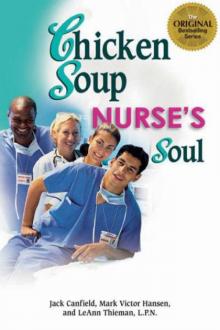 Chicken Soup for the Nurse's Soul: Second Dose
Chicken Soup for the Nurse's Soul: Second Dose Chicken Soup for the Ocean Lover's Soul
Chicken Soup for the Ocean Lover's Soul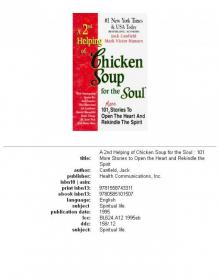 A 2nd Helping of Chicken Soup for the Soul
A 2nd Helping of Chicken Soup for the Soul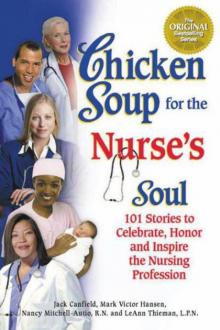 Chicken Soup for the Nurse's Soul
Chicken Soup for the Nurse's Soul Chicken Soup for the Breast Cancer Survivor's Soul
Chicken Soup for the Breast Cancer Survivor's Soul Chicken Soup for the Pet Lover's Soul
Chicken Soup for the Pet Lover's Soul Chicken Soup for the Bride's Soul
Chicken Soup for the Bride's Soul A Chicken Soup for the Soul Christmas
A Chicken Soup for the Soul Christmas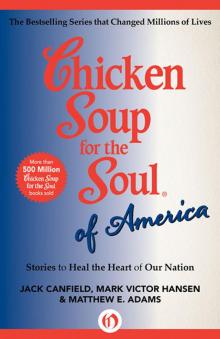 Chicken Soup for the Soul of America
Chicken Soup for the Soul of America Chicken Soup for the Teenage Soul on Tough Stuff
Chicken Soup for the Teenage Soul on Tough Stuff A Taste of Chicken Soup for the Teenage Soul III
A Taste of Chicken Soup for the Teenage Soul III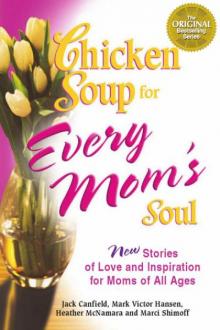 Chicken Soup for Every Mom's Soul
Chicken Soup for Every Mom's Soul Chicken Soup for the Dog Lover's Soul
Chicken Soup for the Dog Lover's Soul A Second Chicken Soup for the Woman's Soul
A Second Chicken Soup for the Woman's Soul Chicken Soup for the Soul the Book of Christmas Virtues
Chicken Soup for the Soul the Book of Christmas Virtues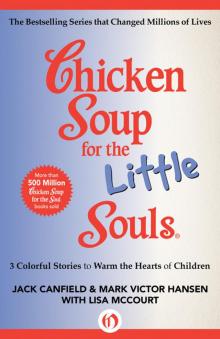 Chicken Soup for the Little Souls: 3 Colorful Stories to Warm the Hearts of Children
Chicken Soup for the Little Souls: 3 Colorful Stories to Warm the Hearts of Children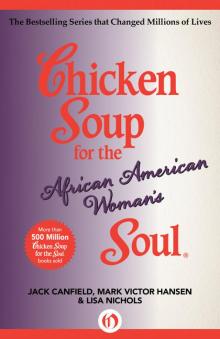 Chicken Soup for the African American Woman's Soul
Chicken Soup for the African American Woman's Soul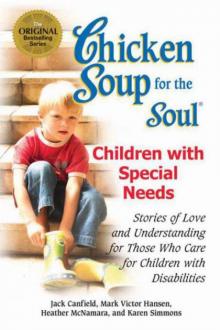 Chicken Soup for the Soul
Chicken Soup for the Soul Chicken Soup for the Soul Celebrates Teachers
Chicken Soup for the Soul Celebrates Teachers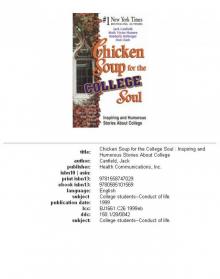 Chicken Soup for the College Soul
Chicken Soup for the College Soul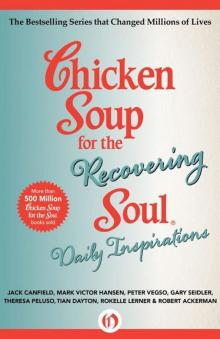 Chicken Soup for the Recovering Soul Daily Inspirations
Chicken Soup for the Recovering Soul Daily Inspirations Chicken Soup for the Soul Celebrates Sisters
Chicken Soup for the Soul Celebrates Sisters Chicken Soup for the Dieter's Soul
Chicken Soup for the Dieter's Soul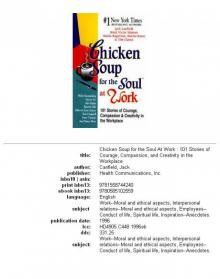 Chicken Soup for the Soul at Work 101 Stories of Courage
Chicken Soup for the Soul at Work 101 Stories of Courage Chicken Soup for the Beach Lover's Soul
Chicken Soup for the Beach Lover's Soul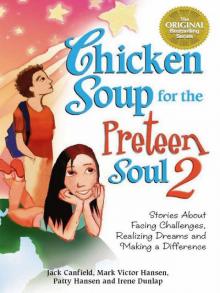 Stories About Facing Challenges, Realizing Dreams and Making a Difference
Stories About Facing Challenges, Realizing Dreams and Making a Difference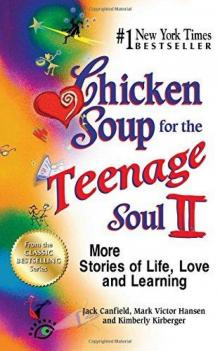 Chicken Soup for the Teenage Soul II
Chicken Soup for the Teenage Soul II Chicken Soup for the Girl's Soul
Chicken Soup for the Girl's Soul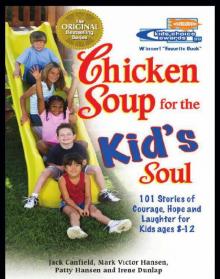 Chicken Soup for the Kid's Soul: 101 Stories of Courage, Hope and Laughter
Chicken Soup for the Kid's Soul: 101 Stories of Courage, Hope and Laughter Chicken Soup for the Woman's Soul
Chicken Soup for the Woman's Soul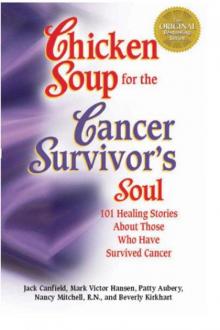 Chicken Soup for the Cancer Survivor's Soul
Chicken Soup for the Cancer Survivor's Soul Chicken Soup for the Canadian Soul
Chicken Soup for the Canadian Soul Chicken Soup for the Military Wife's Soul
Chicken Soup for the Military Wife's Soul A 4th Course of Chicken Soup for the Soul
A 4th Course of Chicken Soup for the Soul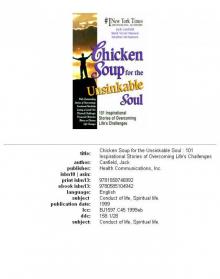 Chicken Soup Unsinkable Soul
Chicken Soup Unsinkable Soul Chicken Soup for the Soul: Christmas Magic
Chicken Soup for the Soul: Christmas Magic Chicken Soup for the Grandma's Soul
Chicken Soup for the Grandma's Soul Chicken Soup for the Soul: All Your Favorite Original Stories
Chicken Soup for the Soul: All Your Favorite Original Stories Chicken Soup for the Expectant Mother's Soul
Chicken Soup for the Expectant Mother's Soul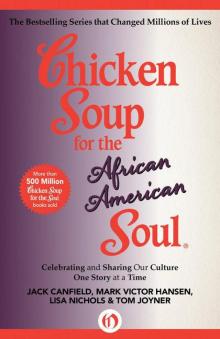 Chicken Soup for the African American Soul
Chicken Soup for the African American Soul 101 Stories of Changes, Choices and Growing Up for Kids Ages 9-13
101 Stories of Changes, Choices and Growing Up for Kids Ages 9-13 Christmas Magic
Christmas Magic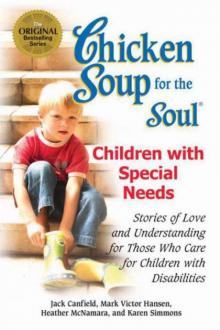 Chicken Soup for the Soul: Children with Special Needs
Chicken Soup for the Soul: Children with Special Needs Chicken Soup for the Soul: Country Music: The Inspirational Stories behind 101 of Your Favorite Country Songs
Chicken Soup for the Soul: Country Music: The Inspirational Stories behind 101 of Your Favorite Country Songs Chicken Soup for the Country Soul
Chicken Soup for the Country Soul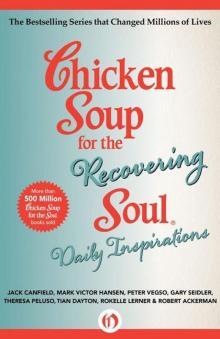 Chicken Soup for the Recovering Soul Daily Inspirations (Chicken Soup for the Soul)
Chicken Soup for the Recovering Soul Daily Inspirations (Chicken Soup for the Soul) A 3rd Serving of Chicken Soup for the Soul
A 3rd Serving of Chicken Soup for the Soul The Book of Christmas Virtues
The Book of Christmas Virtues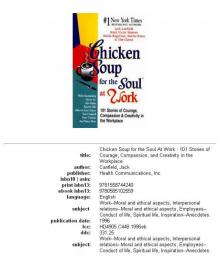 Chicken Soup for the Soul at Work
Chicken Soup for the Soul at Work Chicken Soup for the Soul 20th Anniversary Edition
Chicken Soup for the Soul 20th Anniversary Edition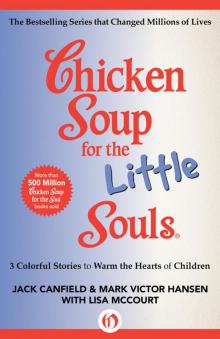 Chicken Soup for the Little Souls
Chicken Soup for the Little Souls Chicken Soup for the Soul: Reader's Choice 20th Anniversary Edition
Chicken Soup for the Soul: Reader's Choice 20th Anniversary Edition Chicken Soup for the Soul Christmas
Chicken Soup for the Soul Christmas Taste of Chicken Soup for the Teenage Soul III
Taste of Chicken Soup for the Teenage Soul III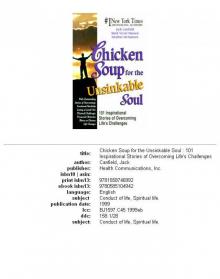 Chicken Soup for the Unsinkable Soul
Chicken Soup for the Unsinkable Soul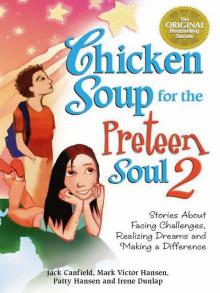 Chicken Soup for the Preteen Soul II
Chicken Soup for the Preteen Soul II